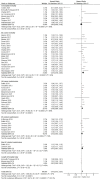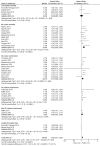Relationship between comorbidity and health outcomes in patients with heart failure: a systematic review and meta-analysis
- PMID: 37817062
- PMCID: PMC10563307
- DOI: 10.1186/s12872-023-03527-x
Relationship between comorbidity and health outcomes in patients with heart failure: a systematic review and meta-analysis
Abstract
Background: The prevalence of heart failure (HF) is expected to rise due to increased survivorship and life expectancy of patients with acute heart conditions. Patients with HF and other multiple comorbid conditions are likely to have poor health outcomes. This study aimed to assimilate the current body of knowledge and to provide the pooled effect of HF patients' comorbid conditions on health outcomes.
Methods: A systematic search was performed using MEDLINE, EMBASE and CINAHL databases. Observational studies evaluating the relationship between comorbid conditions and the health outcomes of HF were included. The pooled effect sizes of comorbidity on the identified health outcomes were calculated using a random effects model, and the heterogeneity was evaluated using I2 statistics.
Results: A total of 42 studies were included in this review, and a meta-analysis was performed using the results of 39 studies. In the pooled analysis, the presence of a comorbid condition showed a significant pooled effect size in relation to the prognostic health outcomes: all-cause mortality (HR 1.31; 95% CI 1.18, 1.45), all-cause readmission (HR 1.16; 95% CI 1.09, 1.23), HF-related readmission (HR 1.13; 95% CI 1.05, 1.23), and non-HF-related readmission (HR 1.17; 95% CI 1.07, 1.27). Also, comorbidity was significantly associated with health-related quality of life and self-care confidence. Furthermore, we identified a total of 32 comorbid conditions from included studies. From these, 16 individual conditions were included in the meta-analyses, and we identified 10 comorbid conditions to have negative effects on overall prognostic outcomes: DM (HR 1.16, 95% CI 1.11, 1.22), COPD (HR 1.31, 95% CI 1.23, 1.39), CKD (HR 1.18, 95% CI 1.14, 1.23, stroke (HR 1.25, 95% CI 1.17, 1.31), IHD (HR 1.17, 95% CI 1.11, 1.23), anemia (HR 1.42, 95% CI 1.14, 1.78), cancer (HR 1.17, 95% CI 1.04, 1.32), atrial fibrillation (HR 1.25, 95% CI 1.01, 1.54), dementia (HR 1.19, 95% CI 1.03, 1.36) and depression (HR 1.17, 95% CI 1.04, 1.31).
Conclusions: Comorbid conditions have significantly negative pooled effects on HF patient health outcomes, especially in regard to the prognostic health outcomes. Clinicians should carefully identify and manage these conditions when implementing HF interventions to improve prognostic outcomes.
Keywords: Comorbidity; Heart failure; Meta-analysis; Multimorbidity; Observational study; Systematic review.
© 2023. BioMed Central Ltd., part of Springer Nature.
Conflict of interest statement
The authors declare no competing interests.
Figures








References
-
- Tsao CW, Aday AW, Almarzooq ZI, Alonso A, Beaton AZ, Bittencourt MS, et al. Heart Disease and Stroke Statistics-2022 update: a Report from the American Heart Association. Circulation. 2022;145(8):e153–e639. - PubMed
-
- Dharmarajan K, Dunlay SM. Multimorbidity in older adults with heart failure. Clin Geriatr Med. 2016;32(2):277–89. - PubMed
-
- Stewart S, Riegel B, Thompson DR. Addressing the conundrum of multimorbidity in heart failure: do we need a more strategic approach to improve health outcomes? Eur J Cardiovasc Nurs. 2016;15(1):4–7. - PubMed
Publication types
MeSH terms
LinkOut - more resources
Full Text Sources
Medical
Research Materials
Miscellaneous

